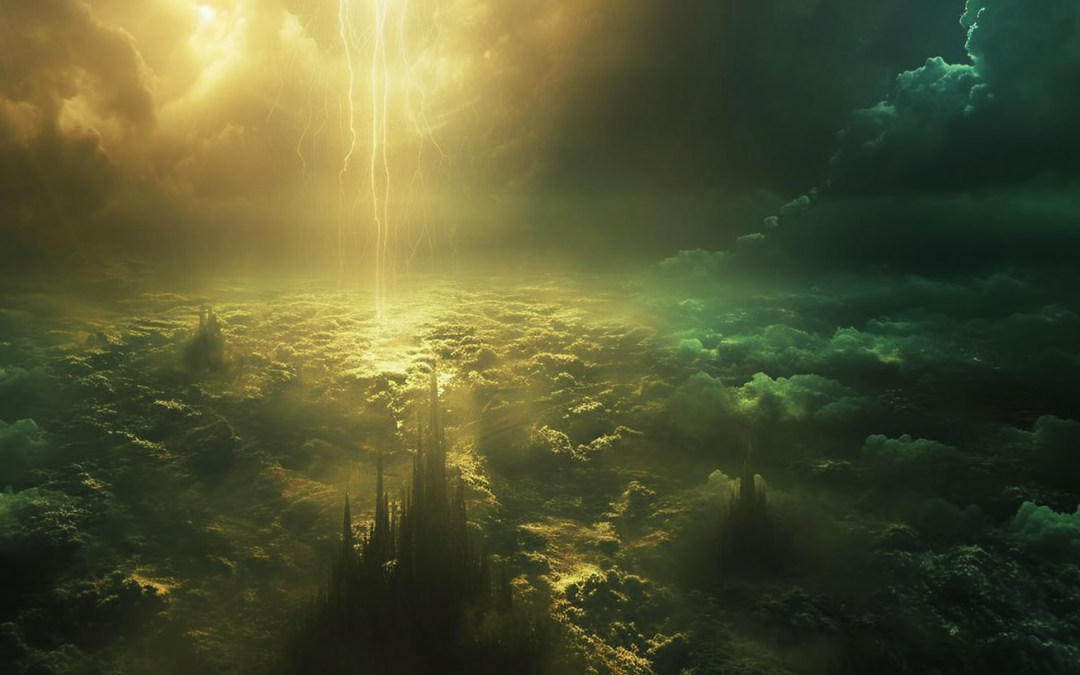Dreaming of rapture can have various interpretations depending on the context. It might symbolize a deep sense of joy, ecstasy, or spiritual fulfillment. Alternatively, it could represent a desire for escape or a longing for a transformative experience. The emotional tone and specific details of the dream are crucial for a more accurate interpretation.
Keywords : Joy, Ecstasy, Spiritual Fulfillment, Escape
Rating : The positivity scale depends on the emotional tone and individual associations with the concept of rapture.
Dreaming about the rapture can leave you feeling bewildered upon waking. It’s a powerful experience that might have you questioning the deeper significance behind such a vivid dream. You’re not alone in your curiosity—rapture dreams are a common theme that many people explore for spiritual and psychological insights.
Navigating the symbolism of rapture dreams can be both intriguing and enlightening. Whether you’re someone with a strong religious background or simply someone who’s interested in the mysteries of dream interpretation, understanding the meaning behind these apocalyptic visions can provide clarity and perspective on your waking life. Let’s delve into the world of dream analysis and uncover what your subconscious may be trying to tell you.
What is the Rapture?

When you’re exploring rapture dreams, it’s crucial to understand the concept of the Rapture itself. The term “Rapture” describes a future event in many Christian eschatologies where believers in Jesus Christ will be taken from Earth by God into heaven. The Rapture is often associated with the Second Coming, where it’s believed Jesus will return to Earth to reign and bring about the final judgement.
There are a variety of interpretations about how and when the Rapture will occur. Some foresee it as a sudden, unexpected event in which people are taken without warning, leaving those left behind to face a period of tribulation. Others imagine it as a more serene, transformative experience. No matter the interpretation, rapture events are considered to be of supreme importance and signify salvation and redemption for believers.
If you’re dreaming about the Rapture, it may reflect an array of emotions and thoughts related to your spirituality or personal beliefs. Are you feeling worthy of being ‘taken’? Or perhaps you’re grappling with the idea of being ‘left behind’? Dreams about the Rapture could indicate:
- A desire for escape or relief from your current circumstances
- Feeling chosen or special in some aspect of your life
- Anxiety around being judged or evaluated
- A call to reassess your life’s path and choices
In religious contexts, the Rapture is deeply symbolic, representing a fulfillment of prophecy and the ultimate connection with the divine. For someone involved with or exposed to these beliefs, dreams incorporating rapture themes might be particularly impactful. They can also serve as a reminder to reflect on your values, actions, and how you align with what you feel to be your ultimate purpose.
Understanding the theological grounds of the Rapture will help you better interpret your dreams about it. Remember, dream analysis is a personal journey and what the Rapture signifies in your dream may be unique to you. Reflect on the emotions and circumstances depicted in your dream to uncover deeper insights into your waking life.
The Significance of Dreams
Dreams are your mind’s powerful way to communicate inner thoughts, feelings, and desires. Often, they are a collage of images and scenarios playing out fears, hopes, and even unacknowledged emotions. When you dream of significant theological events like the Rapture, it’s not just mere fragments of imagination; they can be profound revelations about your psychological or spiritual state.
Dreams can serve multiple functions in your life:
- Reflection of your inner self: They mirror your deepest concerns and joys, providing insight into your subconscious.
- Emotional regulation: Dreams help process emotions, making sense of your daily experiences through symbolic representation.
- Problem-solving: They may present unique solutions to challenges you’re facing – occasionally, in abstract or unexpected ways.
- Preparation for future stresses: By simulating potential real-world events, dreams can enable you to confront and cope with anxieties in a safe space.
The content and frequency of your dreams can be shaped by what you’re going through in life. If you’re exploring themes of the Rapture, it might hint at a transformative period you’re experiencing or anticipating. Dreams about being caught up in the Rapture could imply a longing for liberation or denote feelings of worthiness or unworthiness based on your virtues or faults.
To delve into the psychological implications of rapture dreams, consider the emotions they evoke. Are you fearful or at peace? Examining the emotions tied to these dreams can be as revealing as the dreams themselves – eliciting self-awareness and potentially even prompting actions in your waking life.
Remember, your dreams are intimate narratives that intertwine with your spiritual journey. They can reveal desires for a closer connection with the divine or express concerns about readiness and redemption. Analyzing them can provide clarity on your spiritual path, possibly suggesting a need for introspection or changes in personal doctrine.
Exploring Symbolism in Rapture Dreams

Dreams about the Rapture are rich with symbolism, often intertwining with your deepest thoughts and beliefs. When you dream of being caught up in the Rapture, the feeling of ascending or being chosen reflects a desire for growth or elevation in some aspect of your life.
The Essence of Rapture Dreams
- Triumph over troubles
- Yearning for purity and salvation
- Sense of urgency or substantial change
Rapture dreams might symbolize your aspiration to rise above worldly matters. They convey a longing to be freed from life’s trials and tribulations. Such dreams suggest you’re searching for a state of spiritual or moral purity. They may also implant a seed of urgency, hinting that major life changes are on the horizon.
Interpreting the Elements
Focus on the elements present in your Rapture dreams:
- The act of being chosen: Suggests feelings of validation or fear of being left behind.
- Seeing others being taken: Can represent your views on salvation and worthiness.
- Darkness or light: Often signifies your perception of the unknown or the divine.
The symbolism can be a mirror of your emotions and perspectives. If you’re feeling validated in a dream of being chosen, it could mean you’re seeking acknowledgment in your waking life. Alternatively, seeing others ascend might highlight your worries about being worthy or your thoughts on exclusivity in salvation.
Emotional Undercurrents
Examine the emotions felt during these dreams as they are crucial in decoding their meanings. Fear, elation, confusion, or peace — each feeling contributes to the overall interpretation of your dream. Your emotional responses in these dreams can guide you in understanding the necessary steps to take in your spiritual or personal journey.
Rapture dreams are multidimensional, offering layers of insight. Take note of recurring symbols and emotions as they can be valuable in unlocking profound personal revelations. As you delve into the symbolic language of your subconscious, remember that these dreams are highly personal narratives that may encourage growth and self-awareness.
Religious Perspectives on Rapture Dreams
When you’re exploring the concept of Rapture dreams from a religious standpoint, you’ll find that different faiths offer diverse interpretations. In Christianity, Rapture dreams may be seen as prophetic or divine messages encouraging readiness for the end times. This belief stems from eschatological scriptures outlining the Rapture, where true believers are taken to heaven at Christ’s return.
Christian viewpoints often align Rapture dreams with an individual’s spiritual state. If you’re experiencing such dreams, it might be interpreted as a call to deepen your faith or as a sign of your strong connection to divine promise. Evangelical interpretations might even suggest that these dreams serve as a warning or an incentive to spread the gospel.
On the other hand, if we explore Judaism or Islam, the interpretation of dreams bearing similarities to the Rapture might differ considerably. Jewish thought traditionally sees dreams as messages from God but is less focused on end-of-world scenarios. Islamic teachings also hold that dreams can be meaningful, with some schools of thought categorizing dreams into various levels of significance, some of which may convey messages about a person’s spiritual path.
In exploring these perspectives, it’s essential to note the impact on one’s waking life:
- Strengthening of religious conviction
- Increased focus on personal spirituality
- Calls to moral or ethical action
Regardless of your religious background, considering the cultural and doctrinal context of your beliefs might shed light on what your subconscious is trying to convey. Are the Rapture dreams you’re having aligned with doctrinal teachings, or do they speak more to individual interpretation? Engaging with such questions bridges the gap between dreams and religious experiences, emphasizing the role of personal belief in the interpretation process.
Psychological Interpretations of Rapture Dreams

When exploring dream psychology, you’ll find that the concept of the Rapture can take on various symbolic meanings beyond its religious connotation. Psychologists might suggest that dreaming of the Rapture is an expression of deep-seated anxieties or a manifestation of your fear of change or of being left behind. Dreams, in this context, are your subconscious mind processing your day-to-day experiences, thoughts, and emotions.
Dream analysts often see rapture dreams as significant indicators of transformation. In your waking life, you might be experiencing a period of personal upheaval or transition. The Rapture dream could symbolize your own private end of the world, where one chapter of your life concludes, and an unknown future begins.
Another angle to consider is the feeling of loss of control. The Rapture, an event powerful and divine, is beyond human influence. If you feel powerless in certain aspects of your life, such as your career or personal relationships, this might be your psyche’s way of articulating those feelings. It’s not uncommon for people to dream about cataclysmic events when undergoing a sense of upheaval.
Stress and anxiety are also primary contributors to such potent dream imagery. If your life is filled with stressors, your dreams may include themes of judgment or selection, inherent to the idea of the Rapture, as a reflection of a perceived need to measure up to certain standards or expectations.
In addition to your inner emotional state, consider the influence of media and literature on your dreams. If you’ve been exposed to books, movies, or discussions on the topic of the Rapture, your brain may simply be incorporating these elements into your dream scenarios. Your mind’s propensity to weave narratives while you sleep can often pull from your most recent or intense day-to-day interactions.
By understanding that dreams can serve as mirrors to your internal world, you unlock the ability to dissect and interpret the rich symbolism that your subconscious presents. Whether it’s a call to action, a reflection of stress, or just your mind working through the day’s remnants, each dream offers a personal glimpse into your deeper thoughts and feelings.
Conclusion
Dreams of the Rapture tap into your deepest thoughts and emotions, often reflecting your inner turmoil or aspirations. Whether they’re seen as divine messages or psychological manifestations, it’s clear they hold significant meaning for you. By exploring these dreams, you’re delving into a rich tapestry of personal symbolism and universal themes. Remember, they’re not just nighttime visions but reflections of your own psyche, offering insights that can guide you through life’s complexities. Embrace them as valuable tools for self-discovery and personal growth.

